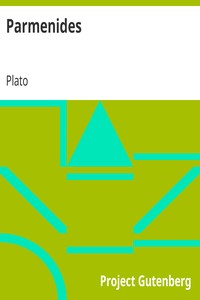Parmenides by Plato
"Parmenides" by Plato is a dialogue written in ancient Greece. It depicts a young Socrates meeting the renowned philosophers Parmenides and Zeno, who challenge his Theory of Forms. Through rigorous questioning, Parmenides presents five complex arguments that expose potential contradictions in Socrates' distinction between eternal Forms and particular things. The work reverses the usual dynamic, positioning Socrates as student rather than teacher, and explores fundamental questions about unity, plurality, and the nature
of reality itself. (This is an automatically generated summary.)
Read or download for free
| How to read | Url | Size | |||
|---|---|---|---|---|---|
| Read now! | https://www.gutenberg.org/ebooks/1687.html.images | 266 kB | |||
| EPUB3 (E-readers incl. Send-to-Kindle) | https://www.gutenberg.org/ebooks/1687.epub3.images | 134 kB | |||
| EPUB (older E-readers) | https://www.gutenberg.org/ebooks/1687.epub.images | 136 kB | |||
| Kindle | https://www.gutenberg.org/ebooks/1687.kf8.images | 240 kB | |||
| older Kindles | https://www.gutenberg.org/ebooks/1687.kindle.images | 224 kB | |||
| Plain Text UTF-8 | https://www.gutenberg.org/ebooks/1687.txt.utf-8 | 217 kB | |||
| Download HTML (zip) | https://www.gutenberg.org/cache/epub/1687/pg1687-h.zip | 132 kB | |||
| There may be more files related to this item. | |||||
Similar Books
About this eBook
| Author | Plato, 428? BCE-348? BCE |
|---|---|
| Translator | Jowett, Benjamin, 1817-1893 |
| Title | Parmenides |
| Note | Socrates |
| Note | Wikipedia page about this book: en.wikipedia.org/wiki/Parmenides_(dialogue) |
| Credits | Produced by Sue Asscher, and David Widger |
| Reading Level | Reading ease score: 64.4 (8th & 9th grade). Neither easy nor difficult to read. |
| Language | English |
| LoC Class | B: Philosophy, Psychology, Religion |
| LoC Class | PA: Language and Literatures: Classical Languages and Literature |
| Subject | Classical literature |
| Subject | Dialectic -- Early works to 1800 |
| Subject | Socrates, 470 BC-399 BC |
| Subject | Philosophy, Ancient |
| Subject | Reasoning -- Early works to 1800 |
| Subject | Ontology -- Early works to 1800 |
| Subject | Parmenides |
| Subject | Zeno, of Elea |
| Category | Text |
| EBook-No. | 1687 |
| Release Date | Mar 1, 1999 |
| Most Recently Updated | Apr 28, 2025 |
| Copyright Status | Public domain in the USA. |
| Downloads | 1164 downloads in the last 30 days. |
| Project Gutenberg eBooks are always free! | |

